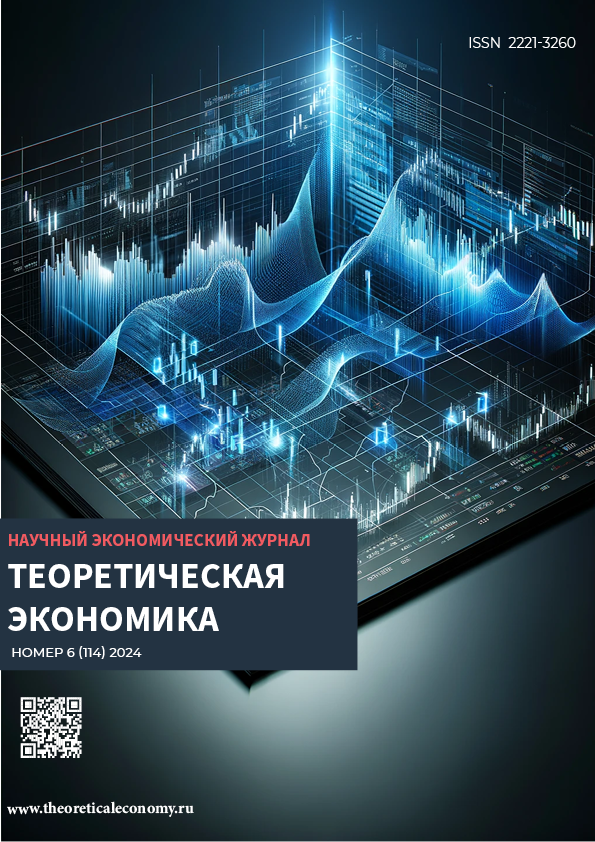Novosibirsk, Novosibirsk, Russian Federation
This article is devoted to the issues of transition to «Industry 4.0» technologies at enterprises of traditional sectors of the economy. The introduction of Industry 4.0 achievements sets trends for transformation and significant improvement of production processes in order to increase their efficiency and safety. The author examines the issues of integrating digital solutions into the technological processes of enterprises and the use of artificial intelligence, which is becoming an integral element of the modern industrial era. The main role of artificial intelligence is to create intelligent systems capable of automating and improving a number of operations in production. At the same time, the possibilities and prospects of using artificial intelligence are considered, and the main challenges and problems associated with the introduction of artificial intelligence into the production processes of industrial enterprises are analyzed. In general, the application of key aspects of Industry 4.0 is a complex process in the field of science, technology and technology, and in this regard, the relevance of researching possible ways to solve emerging and potential problems of expanding the digital transformation of the manufacturing sector and the introduction of Industry 4.0 technologies into production is increasing. The purpose of this article is to show the relevance and timeliness of the use of digital solutions in business processes, to analyze the possibilities of using the achievements of Industry 4.0 in enterprises of traditional industries and to consider the challenges and problems that arise. As a result of the analysis, it can be concluded that in modern Russian companies, the introduction of digital technologies has become a necessity to increase the competitiveness and profitability of business, develop new directions and expand production potential.
business processes, integration, digital solutions, IT technologies, competitiveness, technological processes
1. Frimen S. Kontinental'nye, nacional'nye i subnacional'nye innovacionnye sistemy – vzaimodopolnyaemost' i ekonomicheskiy rost // Politika v oblasti issledovaniy. 2002.Tom 31. № 2. S. 191-211.
2. Carlsson B. Internationalization of innovation systems: A survey of the literature Research Policy. 2006. № 35, 1. pp. 56–67.
3. Baumol W. (2003) Prize Lecture [Electronic resource]. URL: https://www.e-award.org/wp-content/uploads/William-J-Baumol-Prize-Lecture.pdf (data obrascheniya: 20.11.2023)
4. Klimanov D., Tret'yak O. Vzaimosvyaz' issledovaniya biznes-modeley i marketinga: novyy setevoy podhod k analizu biznes-modeley // Zhurnal delovogo i promyshlennogo marketinga. 2019. Tom 34 (1), s. 117-136.
5. Ansong E., Boateng R. Surviving in the digital era — Business models of digital enterprises in a developing economy.// Digital Policy, Regulation and Governance. 2019. 21(2), 164–178. https://doi. org/10.1108/DPRG-08-2018-0046
6. Yudina T.N., Kupchishina E.V. Formirovanie institucional'noy infrastruktury «cifrovoy ekonomiki» v Rossiyskoy Federacii.// Nauchno-tehnicheskie vedomosti Sankt-Peterburgskogo gosudarstvennogo politehnicheskogo universiteta. Ekonomicheskie nauki. 2019. T.12. №4. S.9-19.
7. Sahapova T.S., Ismagilov T.Sh., Tihonov V.A. Cifrovoy dvoynik proizvodstva kak etap novoy cifrovoy biznes-modeli promyshlennogo predpriyatiya.// Gornaya promyshlennost'. 2023. №2. S.62-68.
8. Balashov A.M. Ispol'zovanie dostizheniy «Industrii 4.0» v biznese sovremennyh gornodobyvayuschih kompaniy.// Gornaya promyshlennost'. 2023. № 5. S.34-36.
9. Stadnik D.A., Gabaraev O.Z., Stadnik N.M., Grigoryan K.L.. Povyshenie kachestva cifrovyh «dvoynikov» gornodobyvayuschih predpriyatiy na baze standartizacii atributivnogo napolneniya tehnologicheskih 3D-modeley v GGIS. // Gornyy informacionno-analiticheskiy byulleten' (nauchnotehnicheskiy zhurnal). 2020. № 11-1. S. 202-212.
10. Dorrer, M. G. Realizaciya cifrovogo dvoynika biznes-processov na baze sistemy ELMA.// ITNOU: Informacionnye tehnologii v nauke, obrazovanii i upravlenii. 2021. № 1(17). S. 35-43.
11. Golovcova, I. G., Kim A.A. Cifrovoy dvoynik kak instrument povysheniya effektivnosti i kachestva biznes-processov. // Ekonomika i biznes: teoriya i praktika. 2022. № 11-1(93). S. 85-94.
12. Kazakov, O. D., Azarenko N.Yu. Cifrovye dvoyniki biznes-processov: prostranstvennovremennoy sloy.// Sovremennaya nauka: aktual'nye problemy teorii i praktiki. Seriya: Estestvennye i tehnicheskie nauki. 2022. № 4-2. S. 60-67.
13. Balashov A.M. Perspektivy ispol'zovaniya cifrovyh resheniy i vozmozhnostey «Industrii 4.0» v proizvodstvennyh processah predpriyatiy gornoy promyshlennosti. // Teoreticheskaya ekonomika. 2024. № 2. S. 46-53.
14. Maynfreym: Sistema avtomatizirovannogo planirovaniya, proektirovaniya i soprovozhdeniya gornyh rabot. GEOTECH-3D. Kniga I. Obschie funkcii. Rukovodstvo pol'zovatelya. URL: https://www.prin.ru/images/documents/instrukcii/credo/mainframe/majnfrejm_7_0_kniga_i_obwie_ funkcii.pdf?ysclid=lvpgk2ecuf682383954 (data obrascheniya: 05.04.2024 g.).
15. Ponomarev, K. S., Feofanov A.N., Grishina T.G. Strategiya cifrovogo dvoynika proizvodstva kak metod cifrovoy transformacii predpriyatiya.// Vestnik sovremennyh tehnologiy. 2019. № 4(16). S. 23-30.
16. Bolotova, L.S. Sistemy iskusstvennogo intellekta: modeli i tehnologii, osnovannye na znaniyah: Uchebnik / L.S. Bolotova. - M.: Finansy i statistika, 2012. - 664 c.
17. Gavrilova, A.N. Sistemy iskusstvennogo intellekta / A.N. Gavrilova, A.A. Popov. - M.: KnoRus, 2011. - 248 c.
18. Shpak, P. S. Koncepciya cifrovyh dvoynikov kak sovremennaya tendenciya cifrovoy ekonomiki / P. S. Shpak, E. G. Sycheva, E. E. Merinskaya // Vestnik Omskogo universiteta. Seriya: Ekonomika. – 2020. T. 18, № 1. S. 57-68.
 This work is licensed under Creative Commons Attribution-NonCommercial-NoDerivatives 4.0 International
This work is licensed under Creative Commons Attribution-NonCommercial-NoDerivatives 4.0 International
















